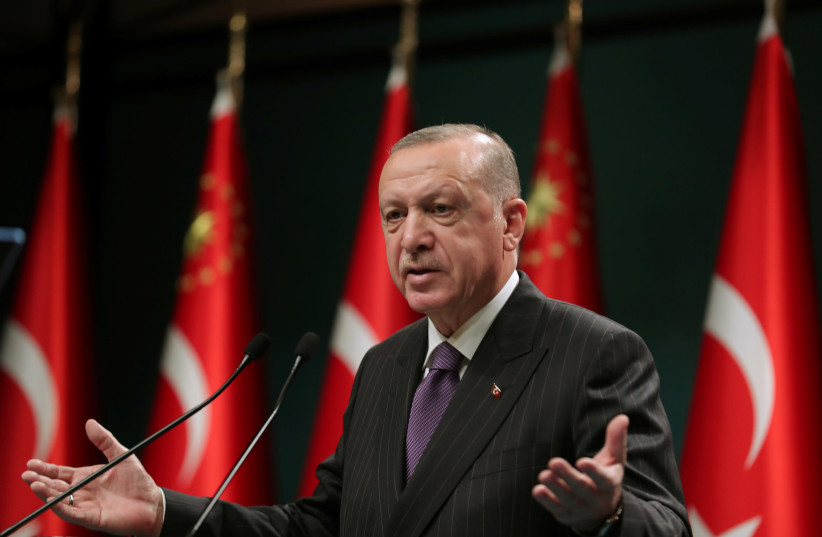The first official meeting since the onset of the Syrian civil war in 2011, involving the defense ministers of Russia, Turkey and Syria, was held in Moscow, last week, in a sign of normalization between Turkey and Syria. The meeting came as Turkish President Recep Tayyip Erdogan has repeatedly declared his willingness to meet Syrian President Bashar Assad, after years of estrangement due to Turkey’s support for Syrian rebel groups and its incursions into many areas in Northern Syria.
This meeting comes with Erdogan’s threats in Northern Syria against the Autonomous Administration of North and East Syria (AANES), also known as Rojava. The Turkish president is seeking to enhance popular support before the Turkish general election, which will be held on June 18.
Presidential Spokesperson Ibrahim Kalın denied the existence of any official channels of direct communication between Ankara and Damascus and said that communication takes place through mediators, such as Russia or Iran, to discuss political and humanitarian issues related to Syrian refugees and the rights of civilians. While Damascus does not seem to be enthused by the Turkish offer for any communication with Turkey before the 2023 elections, revealing that Turkey has shown a willingness to meet Damascus’ demands.
“The meeting attended by Russian Defense Minister Sergei Shoigu and his Turkish and Syrian counterparts focused on ways to resolve the Syrian crisis, the refugees and combating extremist groups in Syria.”
Russian Defense Ministry
“The meeting attended by Russian Defense Minister Sergei Shoigu and his Turkish and Syrian counterparts focused on ways to resolve the Syrian crisis, the refugees and combating extremist groups in Syria,” the Russian Defense Ministry reported.

Turkey wants to deal with Syria, refugees, Kurdish groups ahead of elections
Turkey is hosting approximately four million Syrian refugees, who have become a political liability for Erdogan ahead of the 2023 elections. The opposition parties use this as a pressure point against Erdogan.
Erdogan could reach some type of compromise with the Syrian regime to begin a land operation against Kurdish groups in Northern Syria, with promises to escalate operations and push Kurdish groups away from its border and establish so-called safe zones for the repatriation of Syrian refugees. In addition, Turkey’s economic crisis will also play a role in the next election and could have a direct negative influence on Erdogan and his party.
SYRIA IS currently undergoing a huge economic crisis, in addition to fuel shortages in regime-held areas. Kurdish groups backed by a coalition force led by the United States have dominated the oil fields in the northeast portion of the country. In addition, US economic sanctions continue to harden the government’s ability to provide petroleum products from abroad.
Western sanctions and the currency rate collapse have affected the economic life of the regime-held areas, which are suffering from an acute economic crisis. As a result, the regime-held areas are lacking electricity and water. Daily life and basic needs, such as food and health facilities, are severely compromised.
The Syrian government blames the American sanctions, Kurdish groups, and Turkey’s military airstrikes on energy refineries and power stations. The rising prices of the basic needs of daily life have doubled the economic hardship the country is experiencing, especially in regime-allied areas. With the harsh winter ahead, the severity of the crisis is doubled again and the regime’s allies are in crisis.
Most recently, protests against the Syrian government were launched in the country’s Druze governance of Sweida to protest against the government’s inability to provide fuel in winter and the country’s worsening economic situation since the onset of the war.
Both Assad and Erdogan want to play any game possible, such as the Prisoner’s Dilemma, when two members of a gang, “A” and “B”, are arrested separately. Each prisoner is presented with a “Faustian bargain.” If both confess (defect), each gets five years in prison. If A confesses but B denies the crime, A will be set free whereas B (the sucker) will serve 20 years (and vice versa). But if both deny the crime, both will only serve one year. So from here, we see the need for cooperation between Erdogan and Assad.
But this game depends on the cooperation and trust of both players, which is missing in the case of Turkey and Syria. However, meeting parties agreed to continue tripartite meetings to ensure stability in Syria and in the region as a whole. With the onset of the conflict in Syria, Turkey opposed Assad, supported opposition rebels to change his regime and received about four million Syrian refugees.
Turkey has recently changed its stance towards the Assad regime amid efforts to combat Kurdish groups in the eastern Euphrates. Moscow imposes a forced marriage between Turkey and Syria, although the US still rejects any kind of normalization with the Syrian regime.
The writer is a Syrian Kurd and is doing a master’s program in international relations in the UK. He has been based in Erbil, Kurdistan, for the past 10 years and carries out humanitarian work.
